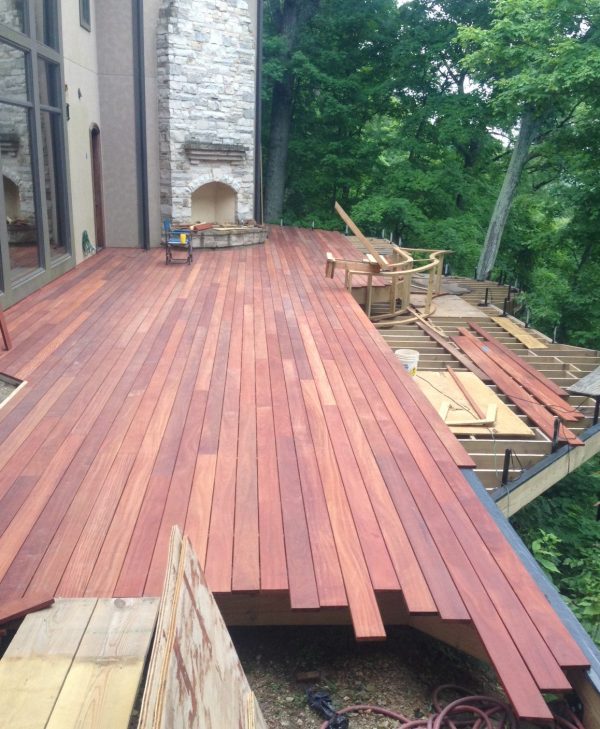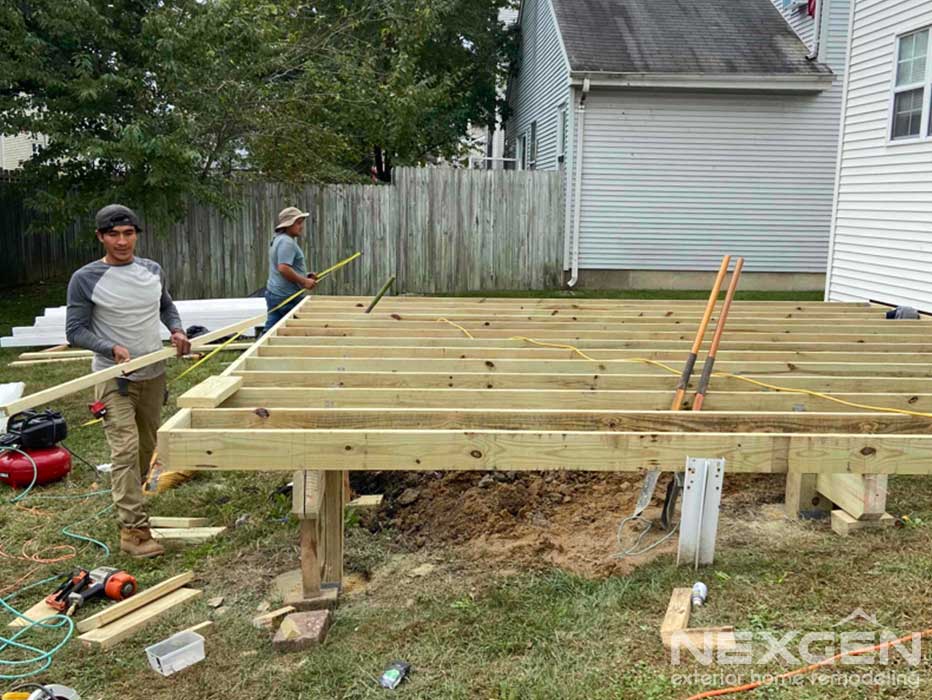Just how to Choose the Right Materials for Your Deck Installation Job
Choosing the proper products for your deck installation project can appear daunting. The key is to balance your budget, layout choices, and way of life needs to develop a deck that will enhance your outdoor room for years to come.
Comprehending the Different Kinds of Deck Products
When beginning on a deck installation task, the selection of materials comes to be a critical choice. Different alternatives are readily available, each with special qualities and visual allure. Conventional wood, as an example, offers a timeless, natural appearance and is typically more affordable. It can warp over time and requires regular maintenance. Compound materials, on the other hand, are a mix of wood and plastic, giving durability and resistance to weather components. They demand much less maintenance contrasted to timber yet are typically much more costly. An additional alternative is plastic, which is virtually maintenance-free and resistant to bugs and rot, albeit less natural-looking. By recognizing these differences, house owners can make a much more informed decision on the most suitable deck material for their certain needs.
Assessing the Longevity and Maintenance Demands of Deck Materials
Evaluating the sturdiness and maintenance needs of deck materials is a critical step in deck installment. Sturdiness includes the product's capability to endure rough climate conditions, wear and tear, and its longevity.
Comprehending upkeep needs is similarly essential. Some materials call for routine securing or tarnishing to keep their look and stand up to moisture damage, while others, like composite outdoor decking, require less maintenance. By evaluating these factors, one can choose the most suitable outdoor decking material, ensuring a balance in between durability, upkeep requirements, and visual appeal.
Price Analysis: Comparing Wood and Compound Decking
Although cost might at first feel like an additional issue, it is a substantial factor when contrasting timber and composite decking. Wood, typically a cheaper choice, has a reduced ahead of time cost. Over time, upkeep costs can gather, potentially making timber much more pricey in the lengthy run. These upkeep costs might consist of discoloration, sealing, or changing damaged boards. On the other hand, composite outdoor decking, while more expensive initially, needs much less upkeep, potentially reducing lasting expenses. Yet, it's vital to remember that composite outdoor decking isn't unsusceptible damage, and replacement prices can be high. As a result, potential deck proprietors have to consider their spending plan and desire to keep their decks when making a decision in between timber and composite outdoor decking.
Visual Appeals and Style Versatility of Decking Products
Natural timber outdoor decking supplies a traditional, timeless look, while composite materials provide a vast variety of colors and structures to suit varied preferences and styles. Composite materials, while much less versatile in layout, are still adaptable sufficient for many deck layouts. These aspects, consequently, are important factors in the choice of outdoor decking product.
Ecological Influence of Decking Materials
When picking outdoor decking materials, one need to take into consideration not just looks and toughness, but additionally the environmental effect. It is very important to assess the sustainability of materials and discover recycled outdoor decking alternatives. Comprehending the possible effect on regional environments will certainly make sure a more ecologically responsible option.
Assessing Product Sustainability
In the world of deck building, examining material sustainability is a crucial step. Composite outdoor decking products usually integrate timber and plastic, reducing the need for brand-new lumber yet enhancing reliance on fossil gas - deck installation austin. Hence, the option of decking products should stabilize capability, aesthetics, cost, and sustainability to make certain a responsible and durable installation.
Recycled Outdoor Decking Alternatives

Compound outdoor decking is particularly preferred because of its durability and simplicity of upkeep. It's immune to rot, bugs, and fading, making it a lasting option. Recycled plastic outdoor decking, on the other hand, is extremely durable and requires marginal upkeep. While these materials may carry a greater initial expense, their durability and reduced environmental impact make them a sensible investment for the eco-conscious homeowner.

Effect On Local Ecosystems
While the benefits of making use of recycled products for outdoor decking can not be overstated, it's equally important to consider the wider environmental ramifications of these selections. Correct disposal of old outdoor decking is crucial to decreasing land fill waste. Essentially, an eco-conscious deck project demands mindful material option, lasting sourcing, and accountable disposal.
Making Your Decision: Tips for Choosing the Best Deck Materials
As the write-up transitions right into the subtopic of "Making Your see it here Decision: Tips for Picking the very best Deck Materials", it is important to recognize the variety of deck products offered. Striking a balance between resilience and looks is crucial in this selection process. The adhering to conversation will certainly assist visitors in making an informed option based on these crucial factors to consider.
Recognizing Various Deck Products
The job of selecting the best products for your deck setup can appear intimidating due to the large selection of alternatives additional info offered. Plastic or PVC decks are even more durable and call for much less upkeep than composite materials, but they can look less natural. Aluminum decks are strong, lightweight, and immune to rot, but they are additionally the most pricey option.
Toughness vs. Looks Balance
Stabilizing durability with appearances can be a challenge when selecting deck materials. The choice typically steams down to individual choices and the deck's intended usage. High-traffic locations may necessitate resilient products like composite decking, which endures wear and tear yet may lack the all-natural appeal of wood. On the other hand, wood offers an ageless charm and heat that synthetic products struggle to reproduce. It needs a lot more upkeep and might not last as long. As a result, home owners need to strike a balance, taking into consideration both the deck's useful needs and their visual preferences. By doing so, they can ensure their deck remains a practical and attractive outside area for several years to find.
Final thought
Finally, selecting the ideal materials for your deck installment project requires cautious factor to consider of factors such as durability, maintenance, expense, aesthetics, and ecological influence. Whether you select traditional timber or composite materials, your selection needs to line up with your budget, layout choices, and lifestyle. Inevitably, the finest decking product is one that boosts your outside room and provides click now enjoyment for several years to come.